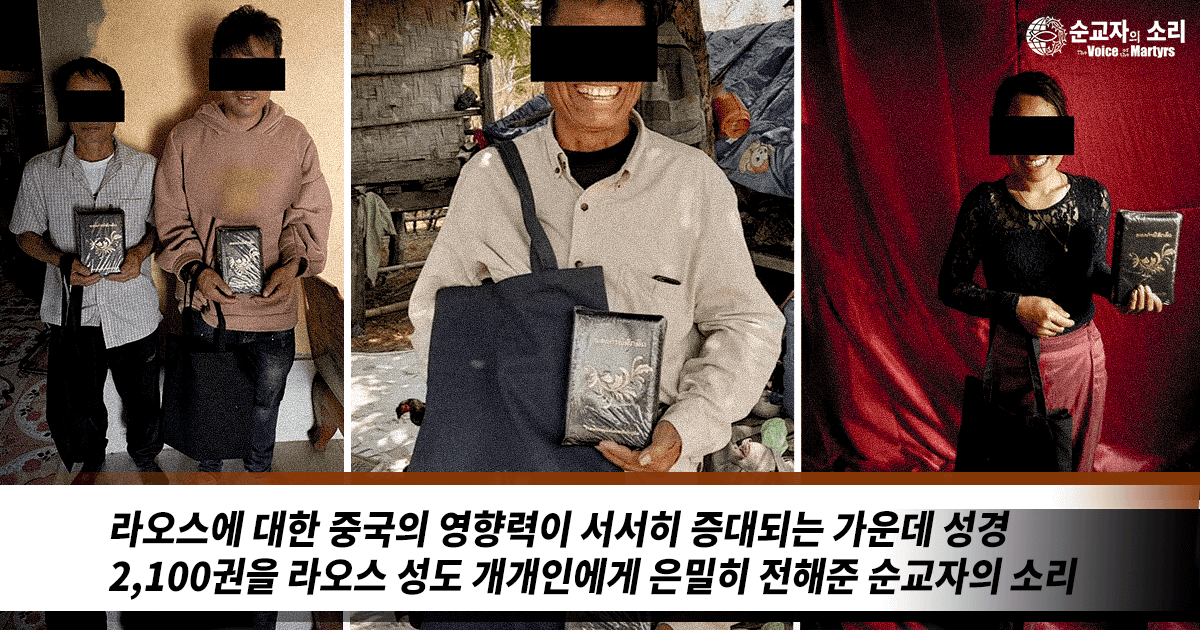
LAOS: AS CHINA’S INFLUENCE LOOMS, VOMK WORKERS QUIETLY FULFILL 2,100 INDIVIDUAL REQUESTS FOR BIBLES
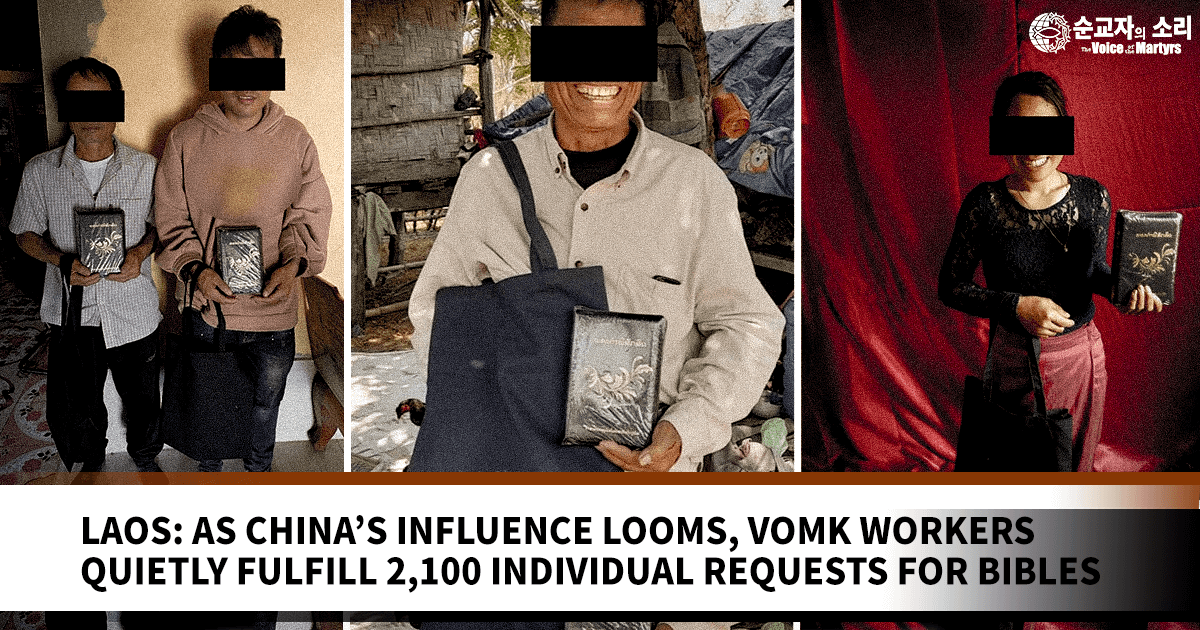
Discrete, personal deliveries of Bibles to Laos Christians have replaced large scale Bible distribution campaigns, due to growing Chinese influence on the Laos government’s religious enforcement policies. That’s the word from Voice of the Martyrs Korea Representative Dr. Hyun Sook Foley. Her organization has been working with local Christian workers in Laos recently to quietly fulfill individual requests for Bibles from 500 church leaders and 1,600 church members in that communist country. 660 requests for hymnals were also fulfilled, she says.
“Laos not only shares a border with China. It shares a communist ideology, and that includes strong restrictions on religion,” says Representative Foley. She points to the July 28 arrest in Laos of Chinese human rights attorney Lu Siwei as he was on his way to the United States as a sign of China’s influence on the Laos government. “We should not be surprised to see Laos adopt China-style religious restrictions to attempt to control its rapidly growing Christian population,” she says.
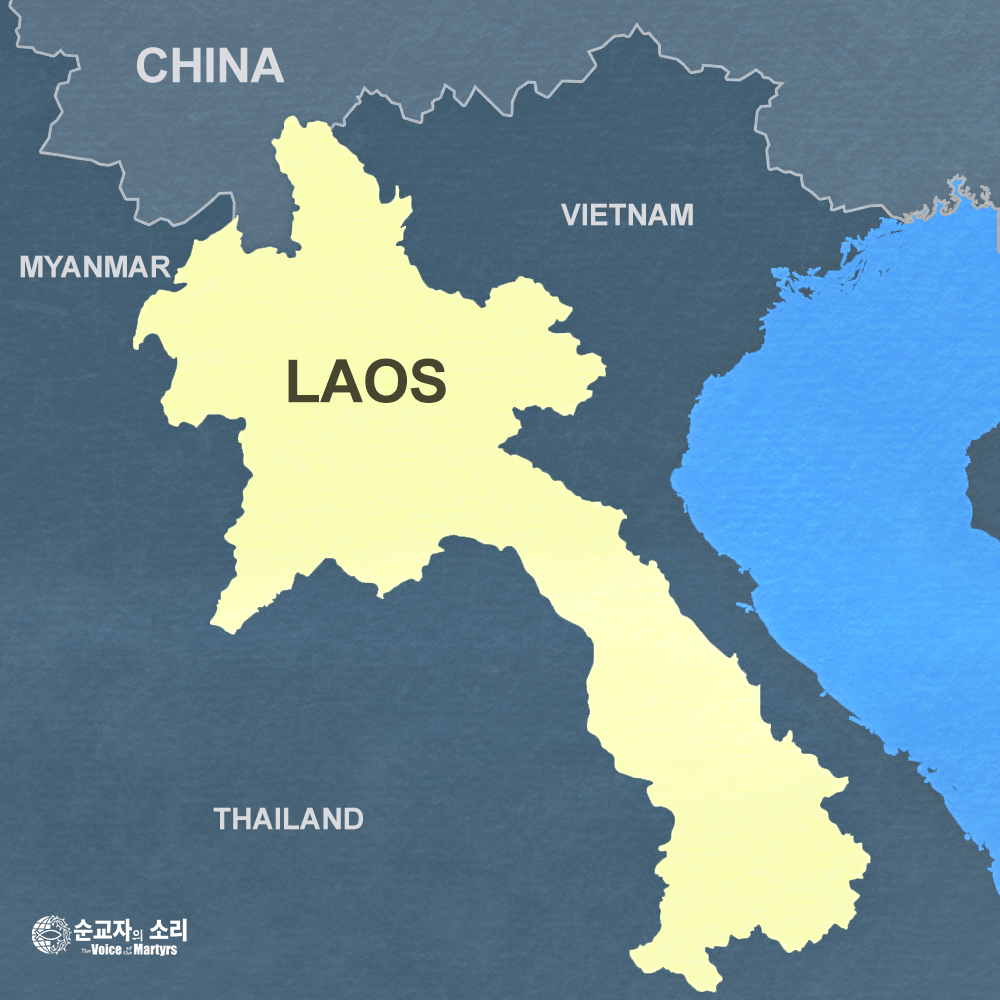
“In 1994 there were 400 Christians in Laos, but by 2020 there were over 250,000, and by the end of 2023, Lao Christians believe there will be over 400,000,” says Representative Foley. She says that sharp increase has led to challenges for the Lao Christian community.
“Persecution and restrictions are the main external challenges,” says Representative Foley. “Most persecution of Christians in Laos is done by family members or village authorities who are concerned that Christianity offends the spirits.” But Representative Foley notes that it is not only the spirits who villagers worry about offending. Lao government authorities also watch the growth of unregistered Christian congregations with concern. “Similar to China, there is a clear expectation and growing pressure by the government for all churches to officially register their existence and fully comply with all religious regulations,” she says. Those regulations also govern access to Bibles. “Bibles are not sold in regular bookstores in Laos,” she says. “The registered churches sell Bibles, and some foreign groups have sought legal permission to bring Bibles in for mass distributions.”
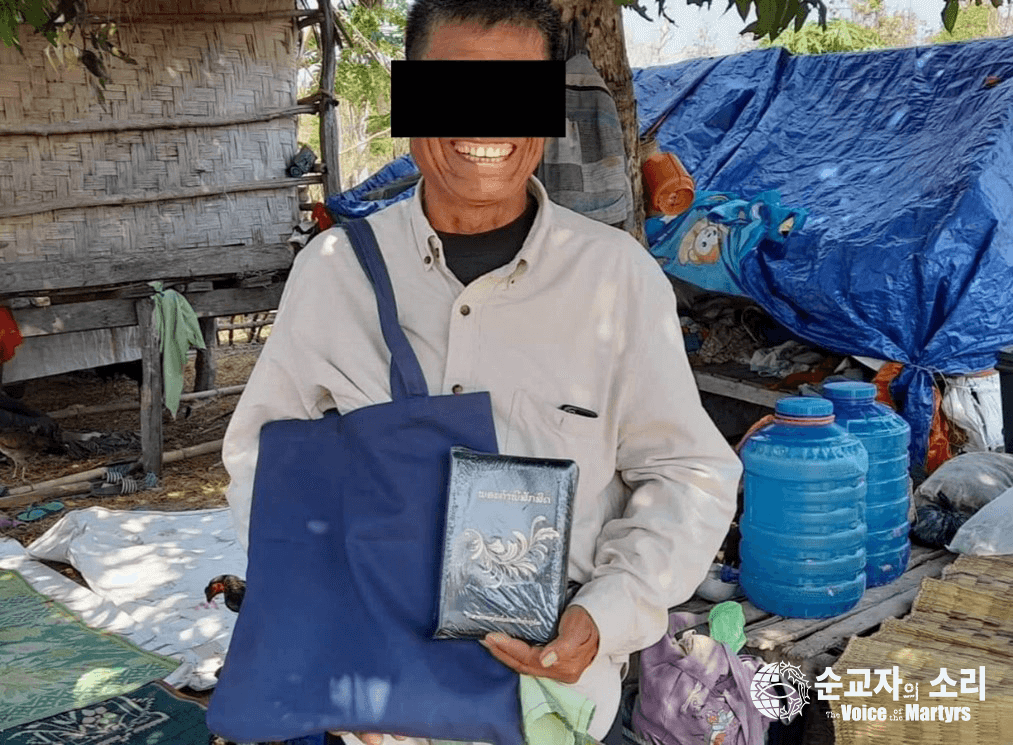
A Lao believer is thrilled to receive a new Bible.
But according to Representative Foley, buying a Bible from a registered church or receiving a Bible from a government-permitted distribution can expose church leaders and local believers to pressure from their fellow villagers or from government authorities. “Public acquisition of a Bible can be like a trail leading suspicious villagers or government authorities right to the door of an unregistered pastor or believer,” says Representative Foley.
She says this is why her organization, Voice of the Martyrs Korea, has been partnering with local Christian workers to enable Lao church leaders and individual believers to request Bibles. Voice of the Martyrs Korea recently received requests from 500 church leaders and 1,600 church members in Laos, along with requests for 660 hymnals. “By quietly providing individual Bibles to the Christians who requested them, we have been able to meet the need while keeping identities confidential and thus keeping Christians safe,” she says.
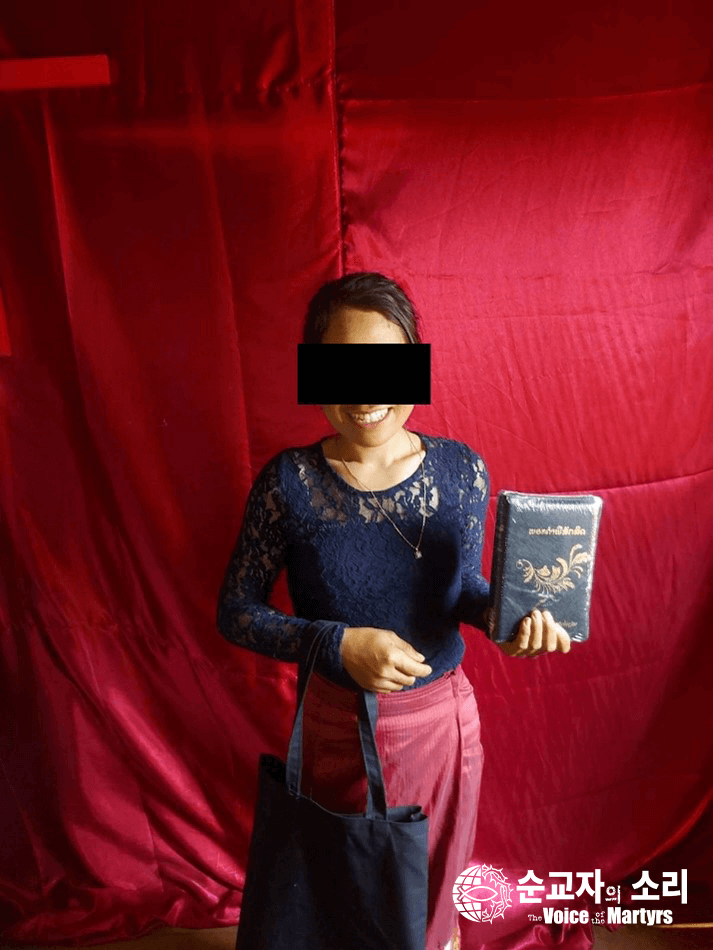
In 1994 there were 400 Christians in Laos, but by 2020 there were over 250,000, and by the end of 2023, Lao Christians believe there will be over 400,000.
Representative Foley notes that due to the massive growth of Christianity in Laos, the majority of congregations do not have a trained pastor. “Most pastors have little schooling, and many do not have Bibles,” says Representative Foley. “The church leader is typically the oldest or wealthiest person in the community. In most villages, no church buildings are allowed. If village leaders notice that a house church is growing, they will try to stop it. Christians have difficulty providing for themselves and their family. They may be unable to get jobs, most of which are through the government. Christians may be denied medical treatment, education and other social services. There are no open Bible schools in the country.” Representative Foley says that the Lao Evangelical Church (LEC) is the only government-recognized church.
But Representative Foley says her organization believes that the best way to address the challenges facing the growing Lao Christian community is privately and quietly, through fulfilling individual requests for Bibles, rather than through large-scale efforts that require centralized coordination with the official church’s structures, as well as government permission. “Early Korean Christian history shows the power of individual Bible distribution,” says Representative Foley. “15,000 copies of the Ross Bible were secretly distributed hand-to-hand before the first missionaries arrived, even with the government actively trying to stop the spread of the faith.” She says that just as the Lao government often follows the Chinese government’s religious policies, the Lao church can learn from the Chinese underground church. “The Chinese government has been able to confiscate the buildings of Chinese megachurches, drive all Bible purchases to official channels, and cut off the large-scale initiatives of American and Korean missionaries seeking to help the Chinese church,” she says. “But it has been much harder for the Chinese government to stop the house-to-house spread of Christianity in the countryside. For the past several years that has been our focus in China: privately supplying Bibles and Bible study materials to individual believers who request them. That approach the Chinese government still can’t stop. The time has come for us to take the same approach in Laos.”
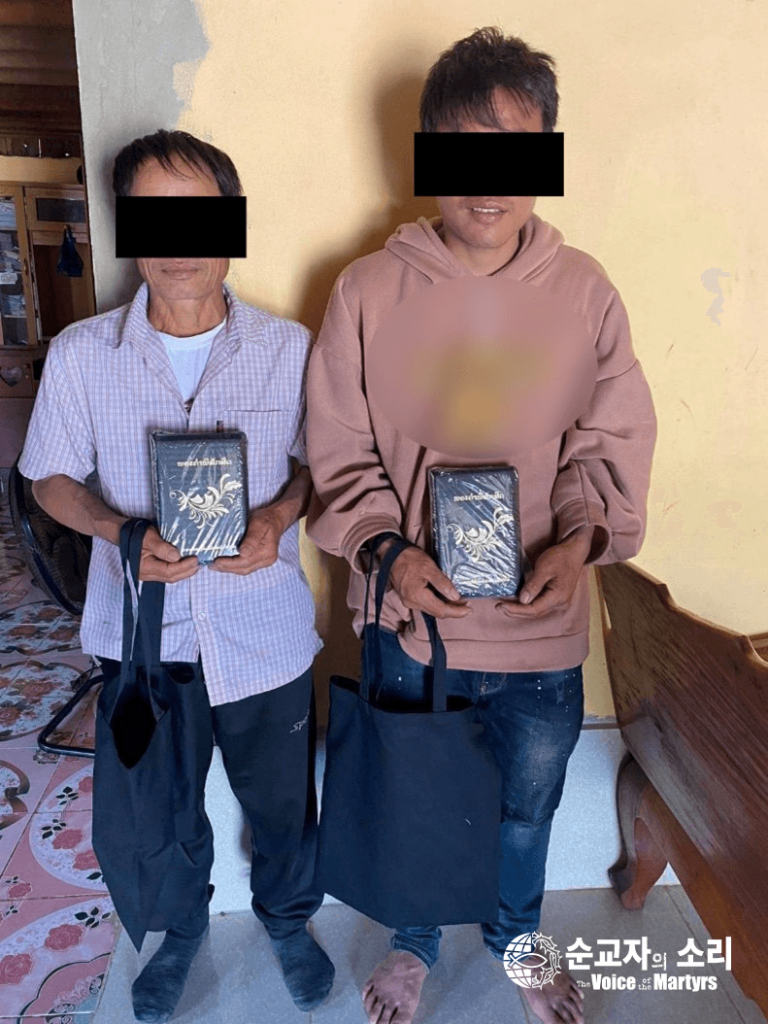
Most Lao pastors have little schooling, and many do not have Bibles.
Representative Foley says Voice of the Martyrs Korea is now working on a plan to quietly get audio Bibles to Lao believers who request them. “There are many Lao Christians who are unable to read or write, especially in the countryside,” she says. “Local workers are compiling a growing list of believers who want to receive those audio Bibles, and we will be working to fulfill those requests in the coming months.”
Individuals interested in learning more about Voice of the Martyrs Korea’s work in partnership with Laotian Christians can visit https://vomkorea.com/en/country-profile/laos/. Donations can be made to www.vomkorea.com/en/donate or via electronic transfer to
국민은행 463501-01-243303
예금주: (사)순교자의소리
Please include the word “Laos” on the donation.

